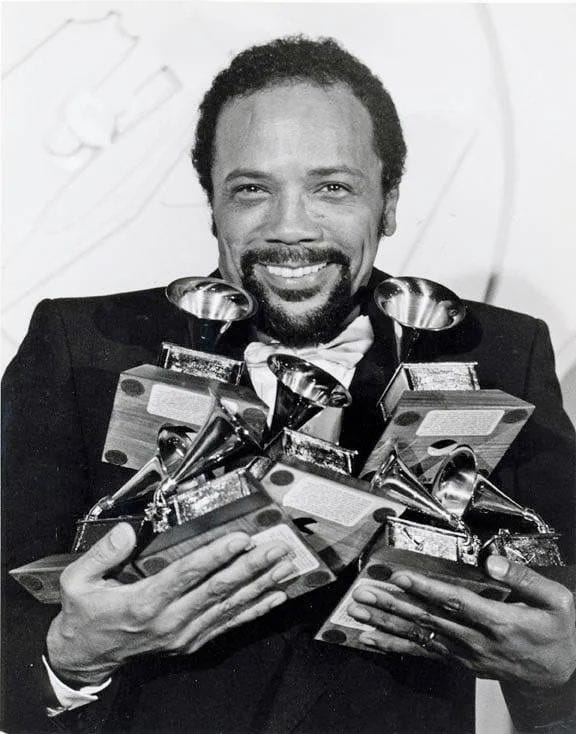Today In Black History: Quincy Jones
Groundbreaking and Award-winning Songwriter and Music Producer
Issue #758 Today In Black History, Monday, November 4, 2024
If you like us, REALLY like us, please click the “Like” button at the end of this post!
Your “Likes” mean a LOT to us! We appreciate your support!
Quincy Delight Jones, Jr., known professionally as Quincy Jones, was born in Chicago, Illinois on March 14, 1933. His musical journey began in Seattle, Washington, where his family moved during his childhood. Jones's family moved to Chicago during the Great Migration.
As a teenager, Jones displayed prodigious talent, learning to play the trumpet and arranging music. His passion led him to enroll at Seattle University and later at Boston's prestigious Berklee College of Music.
After receiving an offer to tour as a trumpeter, arranger, and pianist with bandleader Lionel Hampton, he left his studies and embarked on his professional career. On the road with Hampton, he displayed a gift for arranging songs. Jones moved to New York City, where he received freelance commissions writing arrangements for Ray Charles, who was by then a close friend, and for Sarah Vaughan, Dinah Washington, Count Basie, Duke Ellington, and Gene Krupa.
Jones came to prominence in the 1950s as a jazz arranger and conductor before working on pop music and film scores. He moved easily between genres, producing pop hit records for Lesley Gore in the early 1960s (including "It's My Party") and serving as an arranger and conductor for several collaborations between the jazz artists Frank Sinatra and Count Basie.
In 1968, Jones became the first African American to be nominated for an Academy Award for Best Original Song for "The Eyes of Love" from the film Banning. Jones was also nominated for an Academy Award for Best Original Score for his work on the 1967 film In Cold Blood, making him the first African American to be nominated twice in the same year.
Jones produced three of pop star Michael Jackson's most successful albums: Off the Wall (1979), Thriller (1982), and Bad (1987). In 1985, Jones produced and conducted the charity song "We Are the World,” which raised funds for victims of famine in Ethiopia.
In 1971, Jones became the first African American to be the musical director and conductor of the Academy Awards. In 1995, he was the first African American to receive the academy's Jean Hersholt Humanitarian Award. He is tied with sound designer Willie D. Burton as the second most Oscar-nominated African American, with seven nominations each.
In 1975, Jones founded Qwest Productions, for which he arranged and produced successful albums by Frank Sinatra and others. In 1978, he produced the soundtrack for The Wiz, the musical adaptation of The Wizard of Oz, which starred Michael Jackson and Diana Ross. In 1982, he produced Jackson's Thriller, the bestselling album in the music industry's history.
After the 1985 American Music Awards ceremony, Jones used his influence to draw most of the major American recording artists of the day into a studio to record the song "We Are the World" to raise money for the victims of famine in Ethiopia. When people marveled at his collaboration ability, Jones explained that he had taped a sign on the entrance reading "Check Your Ego at the Door." He was also quoted as saying, "We don't want to make a hunger record in tuxedos," requiring all participants to wear casual clothing in the studio.
In 1986, he started Qwest Entertainment to produce theatrical feature films through Qwest Film and Television and launched a home video label, Qwest Home Video, to manage the studio's home video titles. Qwest Entertainment would continue to operate its pre-existing subsidiaries, such as Qwest Records, Quincy Jones Productions, and Qwest Music Publishing.
Jones's social activism began in the 1960s with his support of Martin Luther King Jr. Jones was one of the founders of the Institute for Black American Music (IBAM), whose events aimed to raise enough funds to create a national library of African-American art and music. Jones was also one of the founders of the Black Arts Festival in his hometown of Chicago.
In the 1970s, Jones formed the Quincy Jones Workshops. Meeting at the Los Angeles Landmark Variety Arts Center, the workshops educated and honed the musicianship, acting, and songwriting skills of inner-city youth.
In 2013, Jones was inducted into the Rock & Roll Hall of Fame in the Ahmet Ertegun Award category. He was named one of the most influential jazz musicians of the 20th century by Time.
Jones' career spanned over 70 years, with 28 Grammy Awards won out of 80 nominations, three honorary doctorates, and a Grammy Legend Award in 1992.
Dr. Quincy Delight Jones, Jr. died at his home in Bel-Air, Los Angeles, on November 3, 2024, at 91.
Today In Black History
In 1872, three Blacks were elected to major offices for the State of Louisiana.
In 1879, Black inventor T. Elkins received a patent for a refrigerating apparatus.
In 1953, Hulan Jack was elected as the first Black Manhattan, NY, Borough President.
In 1969, Howard N. Lee and Charles Evers were elected the first African American mayors of Chapel Hill, NC, and Fayette, MS, respectively.
In 1981, Zena Garrison became the first African American player to win Junior Singles tennis at Wimbledon, England.
In 1984, Prince and his band “The Revolution” opened the “Purple Rain” tour at Joe Louis Arena in Detroit, MI.
In 1988, Dr. Bill Cosby and Camille Cosby donated $20 million to Spelman College in Atlanta.
In 1988, the Martin Luther King, Jr. Federal Building was dedicated in Atlanta, GA.
In 2008, Illinois Democratic Senator Barack Obama won the presidential election, defeating Arizona Republican Senator John McCain. President-elect Obama addressed 250,000 supporters at Grant Park in Chicago. The victory came one day after his “last parent,” his beloved (white) grandmother, died in Hawai’i.
In 2014, Tim Scott became the first African-American Senator from the South since Reconstruction.
All “We Are Speaking” posts are now free for everyone to read, and commenting on our posts is now open to everyone!
Please check out Keith’s SciFi Musings Substack for posts about fantasy, sci-fi, and Afrofuturism!
Our paid subscribers are encouraged to discuss this post in our W.A.S. Chat Community.
Join Pamela Hilliard Owens’s subscriber chat
Available in the Substack app and on the web
You are also welcome to view “We Are Speaking” in Substack Notes. You can also read other Substack publications without subscribing to them when you join Notes.
Did you know that you can listen to each “We Are Speaking” post on the Substack App? Download the app!






